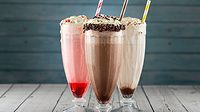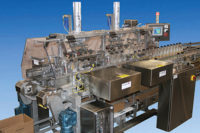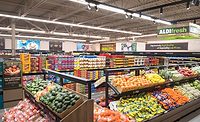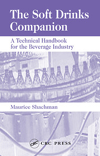![]()
A Well-Oiled Machine
by Richard Mitchell
Providers of food-grade lubricants are finding beverage companies
to be challenging customers. While the lubricants — which are formulated so
they do not contaminate liquids during incidental contact — are essential tools
for reducing health risks, many manufacturers still are not using the food-grade
oils and greases on critical contact points. And those that are leveraging the
products require lubes that can withstand the harsh demands of the industry,
such as supporting machines that operate around the clock and safeguarding equipment
from such highly corrosive elements as sugar and acids.
“Companies that manufacture beer and soft drinks
are going full-tilt 24 hours a day, seven days a week, so their choice of
lubricants becomes critical since they require constant protection,”
says Jim Girard, vice president and general manager of the Lubriplate
Lubricants unit of Newark, N.J.-based Fiske Brothers Refining Co.
“And because beverages contain abrasive compounds, the liquids are a
strong threat to displace the grease.”
Lubricants also must withstand frequent high-pressure
machine cleansings. Beverage plants require constant sanitizing because
spillage can quickly cause steel to deteriorate, says Andy Kromer, national
accounts manager, food/beverage, for Lincoln Industrial, a St. Louis-based
manufacturer of lubrication equipment.
“Without the proper lubricants, manufacturers
must reapply oils and greases after each wash-down because the cleanings
can easily dilute or push the materials out of the bearings,” he
notes.
Food-grade lubricants typically are used on fillers,
seamers and capping apparatus in beverage facilities. Such machines often
contain automatic oil and greasing systems that apply lubes at
predetermined intervals. The procedure enhances plant efficiencies by
enabling machines to operate during lubrication, while also providing a
more uniform distribution of oils and greases inside the bearings.
Though most major beverage manufacturers are
leveraging the increasingly sophisticated food-grade lubricants and
systems, many smaller companies — which do not fully understand the
safety issues — still are risking contamination by relying on
non-food grade products, vendors say.
“A large number of beverage companies are not
aware that they should be using food-grade lubes. But that will change as
plant inspection processes get better over the next several years, and the
need for those products is pounded into them,” notes Lance Landgraf,
manager of market development for Linden, N.J.-based Total Lubricants USA.
Total’s Keystone Lubricants division produces 80 food-grade products.
All lubricants in Keystone’s Nevastane line,
which are used on closers, fillers, conveyors, carbonators and labelers in
beverage plants, are registered as H1 with Ann Arbor, Mich.-based NSF
International. The designation indicates that the greases and oils are
approved by the U.S. Department of Agriculture for use in all federally
inspected plants where there is the possibility of incidental food contact.
Most lubricants are applied to machinery to prevent or
soften the metal-to-metal contact that causes wear-and-tear on an
apparatus. While the majority of plants use food-grade lubes with a mineral
oil base, the stronger and more costly synthetic-based products are
becoming increasingly popular. Synthetics often are more than four times as
expensive as mineral oils, but are much longer lasting.
Diana Judge, global brand and sector manager, food and
beverage, for Houston-based Shell Lubricants, says plants that employ
synthetic lubricants on seamer roll bearings often can extend the life of
the equipment to two and a half or three years. The bearings usually must
be changed every two to three weeks when mineral-based food-grade greases
are used, she notes.
Shell offers 56 products in its line of Cassida
synthetic lubricants, including two designed specifically for the beverage
industry — Cassida RLS1 and Cassida GLE. The greases, which have been
marketed in the United States for the past 18 months, have additives that
enable the products to cling longer to machinery during cleanings.
Synthetic formulations, meanwhile, enable
Keystone’s lubes to function under a wide range of temperatures.
Plant operators, thus, can use a single lubricant for all machinery,
decreasing the chance that inappropriate grease would mistakenly be applied
to a device, Landgraf notes.
“The whole food and beverage industry is moving
to synthetics because people are catching onto the fact that they’re
more durable and last longer,” he adds. “And because one
product can be used for both high and low temperatures, it is less
confusing for operators and requires fewer products to be kept on
hand.”
The overall market for both synthetic and
mineral-oil-based food-grade lubricants, meanwhile, remains strong. Shell,
for instance, found during inspections of its customers’ facilities
that up to 18 percent of potential lubrication points in machinery are not
being greased.
And with bio-terrorism issues and the threat of product recalls putting the spotlight on
contamination-prevention tools, vendors are strengthening their
offerings to meet an expected surge in demand. Tulsa, Okla.-based Citgo
Petroleum Corp., for instance, offers more than 30 food-grade lubricants
under its Clarion and Duoprime brands, and is planning to release a new
line of synthetic products, says Monroe Copeland, product specialist.
Keystone is targeting the beverage sector by
thickening its lubricants to better enable greases to adhere to surfaces.
Lubriplate is marketing its high-viscosity SFGO Ultra 100 and SFGO Ultra
150 synthetic products, and petroleum-based FMO500AW lubricant, to the
beverage market. And Haynes Manfacturing Co, a Westlake, Ohio-based
food-grade lubricant manufacturer, is positioning its Haynes Lubri-Film and
Haynes Spray syn-thetic lube for the industry.
“Beverage plants that often operate with higher
temperatures and more water want these types of products that won’t
easily wash off,” says Beth Kloos, Haynes president.
Yet, in addition to upgrading their lubricants,
vendors also are working to educate beverage manufacturers on the
importance of using advanced food-grade oils and greases. Judge says
operators need to be shown the financial benefits of investing in such
products, including the consequences from machine downtime.
“The decision for selecting lubricants is often made by the
purchasing manager, who is primarily interested in getting the lowest unit cost,”
she notes. “Some are not educated about the quality of the lubricant and what
it can actually do, and others say they have used a particular lubricant for
a long time and are satisfied with it. But they don’t realize they may get more
benefits out of moving to a synthetic.”
While more beverage plants are embracing food-grade
lubricants, many operators still must be shown the advantages of
incorporating synthetic and mineral-based oils and greases in their
facilities. But as companies increasingly focus on ways to further
safeguard their products while cutting manufacturing expenses, their demand
for lubes is expected to escalate. BI






